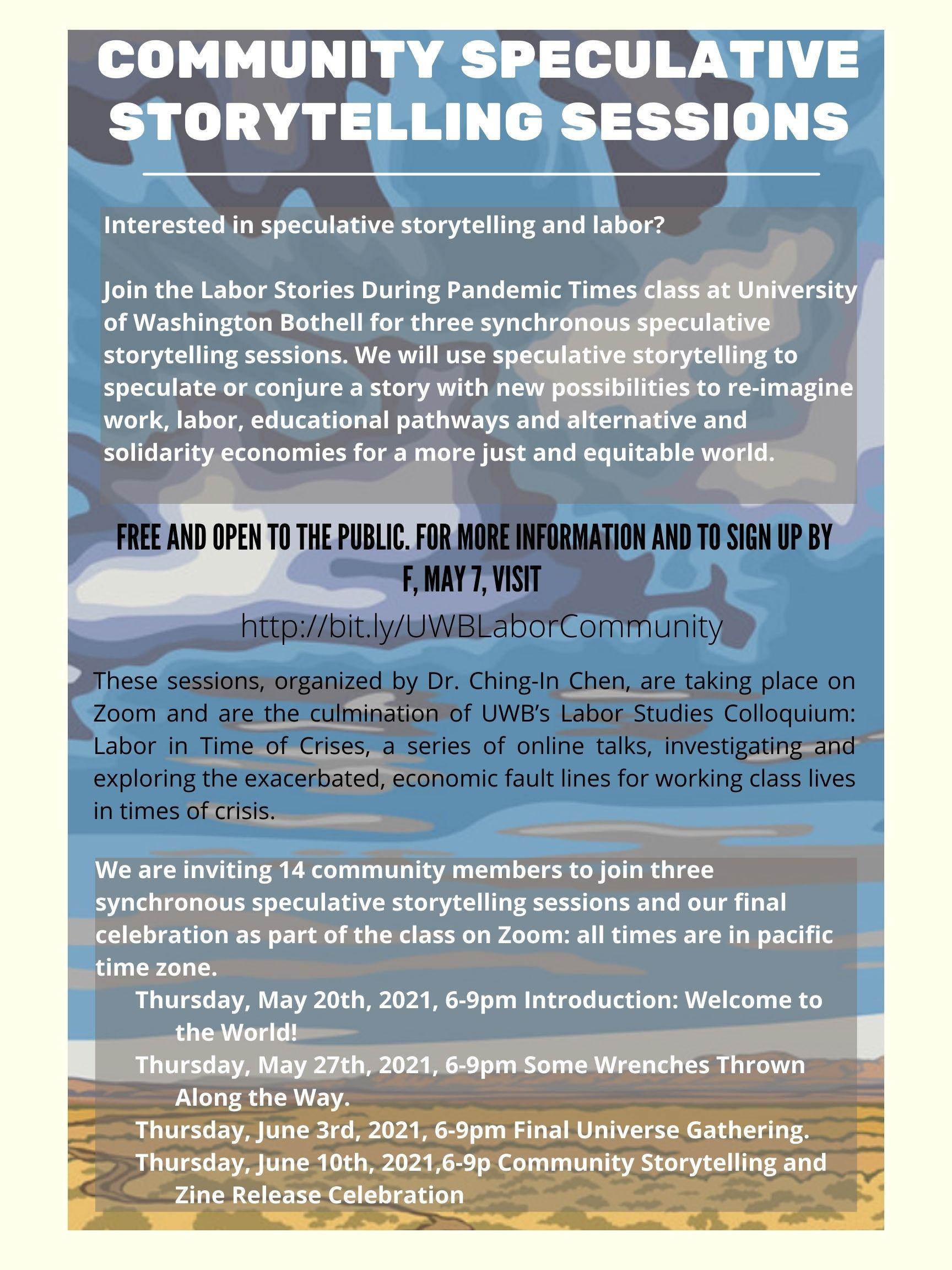Community Participants Sought for "Labor Stories During Pandemic Times"
Join the "Labor Stories During Pandemic Times" class at University of Washington Bothell for three synchronous speculative storytelling sessions. Speculative storytelling uses speculation or conjure to imagine a story with new possibilities for how to think about work, labor, educational pathways and alternative and solidarity economies for a more just and equitable world.
"Labor Stories During Pandemic Times" is an advanced creative writing course focused on investigating and exploring the exacerbated, economic fault lines for working class lives in times of crisis. This course is the culmination of a year of online talks featuring visiting scholars and artists, coordinated by the University of Washington Bothell Labor Studies Colloquium, http://bit.ly/UWBLaborStudies. Part of the class will use speculative storytelling methods to explore the possibilities of re-imagined work, labor and educational pathways as well as alternative and solidarity economies in a more just and equitable future world.
We are inviting 14 community members to join three synchronous speculative storytelling sessions and our final celebration as part of the class on Zoom: all times are in pacific time zone.
- Thursday, May 20th, 2021, 6-9pm Introduction: Welcome to the World!
- Thursday, May 27th, 2021, 6-9pm Some Wrenches Thrown Along the Way
- Thursday, June 3rd, 2021, 6-9pm Final Universe Gathering
In addition, all community participants are invited to our final class celebration on Thursday, June 10th, 6-9p! We will invite speculative storytelling teams to share an excerpt of their work and celebrate the release of students’ work on community storytelling zines with our community partners: Massage Parlor Outreach Project; Aileen’s; Northshore School District Racial & Educational Justice; and Viva Farms (Regeneration Farms; Root and Rabbit Farm; The Color Farm).
Collectively, the week before the first storytelling session, all participants will vote in a Universe Census Poll to determine the overarching story which will determine the major characteristics and conditions of the fictional universe that we will be operating under in our collective speculative storytelling experiment. Throughout the sessions, participants will create individual characters who will move through this speculative world as well as collectively create the origin stories of their particular neighborhood communities within small teams. These neighborhood communities will be tasked to imagine what their communities could offer other neighborhoods as well as what they would like to request from other communities in the form of mutual aid in our final universe gathering session.
WHAT IS THE COMMITMENT?
Community participants will have access to the readings and course schedule and will be encouraged to read/view/listen alongside our class. In addition, community members will be asked to complete creative exercises meant to help develop characters and their neighborhood communities as well as work with their team members outside of our synchronous meeting times, using a shared Google Drive. We anticipate that this work will take approximately three to five hours minimum per week.
HOW TO JOIN?
We have space available for 14 community participants. If we have more interest than we have slots available, we will select participants from a wide range of backgrounds and prioritize those who can make it to all sessions as well as those who are connected to our community partners. If selected, there is no cost to join the speculative storytelling sessions. These Sessions are free and open to the public. If you would like to sign up, please fill out the Google form no later than Friday, May 7. We will confirm your participation by Monday, May 10.
For more information on the class or questions, please contact Ching-In Chen at chingin@uw.edu.
These sessions, organized by Dr. Ching-In Chen, are taking place on Zoom and are the culmination of UWB’s Labor Studies Colloquium: Labor in Time of Crises, a series of online talks, investigating and exploring the exacerbated, economic fault lines for working class lives in times of crisis.
